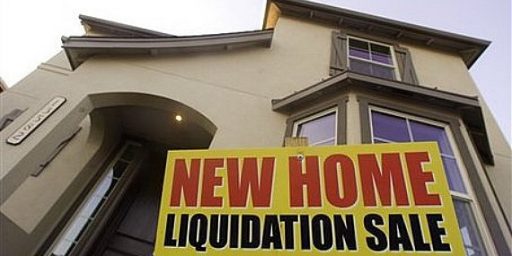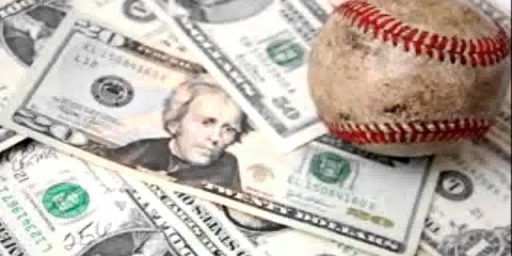The Perverse Incentive to Foreclose
Doug Rushkoff points out that mortgage servicers have very little incentive to help out borrowers who could afford their mortgages by refinancing.
What it means is that mortgage companies can often make more money when the homeowner goes into foreclosure than if the homeowner pays his bills. The longer a homeowner is delinquent, the more late fees and other penalties are accrued. Plus, there’s other fees the mortgage servicer gets if the homeowner goes belly up, once the bank sells the house.
So if a homeowner is beginning to miss payments, it is not to the mortgage lender’s benefit to help him refinance, work out a new payment schedule, or do anything else to keep the loan in place. The mortgage servicer is, as they put it in business, disincentivized to help. He will get paid the most if the borrower misses a lot of payments, and then goes into foreclosure.
This is, sadly, part of the natural evolution of the financial system. When banks go national and mortages are chopped up and sold as assets, homes and communities just become entries in a ledger. Never mind that communities are better off if the homeowner can keep their home through a re-fi. Never mind the drag that foreclosures place on banks. Never mind that in the long term, getting the mortage paid off with slightly less interest is in everyone’s best interest.
One of the primary reasons for our current crisis is that the finance sector of the economy is oftentimes at odds with the part of the economy that actually creates things of value. Obsession with earning high, short-term returns on what is essentially gambling now trumps long-term investment and value creation. None of those incentives have changed in the past year. All the government has done is demonstrated that it’s willing to cover the gambling losses of large financial institutions while people who actually create things and innovate are left out in the cold to pay for it. There are no moves to actually change the institutional incentives created by government policy. Just promises to be “tougher regulators.”
I don’t see how that bodes well for the future.
Image Credit: Jeff Turner







There have been suggestions to change the capital gains tax rates to reward long held investments over short term investments. This idea needs further exploration but could help change some of those attitudes.
It’s been widely reported that modified loans tend to re-fail. That puts the lenders reticence in a little bit more favorable light.
The incentive is to let the mortgages fail, and yet, where’s the data on that actually happening? Even anecdotes?
I’m familiar with several failing mortgages (those would be anecdotes not data, as I’m well aware), and in every case, the mortgage company is working with the homeowner to find a mutually satisfactory compromise.
Sure, it could happen, but it doesn’t appear to actually be happening.
Lets just forget contract law. Lets also forget the fact that lots of these homeowners were gambling that they could flip the house they couldn’t afford in a couple of years to make money. Lets also forget that the government knew going in that these fee structures were in place and choose to just forget them as well. Lets also forget to blame the people who are really at fault, Pres Bill Clinton, the Dem party and especially Cris Dodd and Barney Frank. Without the above, the idea of loaning people money who have no means to pay it back so they could buy a house they couldn’t afford wouldn’t have led to the lowering of the lending rules to basically set the system up for failure. Anything else we need to forget before we blame the evil creditors?
MPW
Well mpw, apparently you forgot that this all came down on Bush’s watch.
“Lets just forget contract law.”
Non recourse loans. That means the risk is all on the lender. The borrower can walk whenever they want.
Will look for the stats later Boyd if have time. Calculated Risk has covered this quite a bit.
Steve
This post was just a jumble of thoughts, and deficient in so many ways.
I didn’t know who Rushkoff was (went and read some stuff: Oy), but I immediately noticed the clever slight of hand between mortgage SERVICERS and mortgage LOANERS. The logic in his case flips back and forth. Very bad form.
The “loan to own” conspiricists have a long history. I’ll bet I’m one of only 5 who visit this cite who could even frame the argument, and perhaps 1 of 2 who could make a credible quantitative stab at it. Let’s just say we are bumping up against the 60 mpg carburetors stuffed by the car companies crowd. Anyone wanting to challenge me on this, including Mr. Rushkoff, feel free.
Hear me: Lenders do not want to foreclose. Period. Its a bad business model except for a tiny, tiny fraction of the industry.
Picking at the carcass:
“This is, sadly, part of the natural evolution of the financial system. When banks go national and mortgages are chopped up and sold as assets, homes and communities just become entries in a ledger. Never mind that communities are better off if the homeowner can keep their home through a re-fi. Never mind the drag that foreclosures place on banks. Never mind that in the long term, getting the mortgage paid off with slightly less interest is in everyone’s best interest.”
Really? Those are bold (and unsubstantiated) assumptions about the intent and ability of the homeowner to repay. Repeated default is the empirical evidence today. And lenders? Care to give us their forebear vs foreclose calcs????
And the effect of global capital markets on mortgage availability, and its affect on expanding home ownership availability? Please tell me we don’t need to go there. Its the analog to “hey, get a horse.”
“Slightly less interest?” Say what? Whose best interests, Kemosabe? I can do the calculations. Would you care to provide your “slightly less interest” calculations to support your assertion? And the effect on capital movement and mortgage availability? Wow!! And prey tell how is the “community,” who is better off as you say, to support the effort?
“One of the primary reasons for our current crisis is that the finance sector of the economy is oftentimes at odds with the part of the economy that actually creates things of value.”
“Actually create things of value, eh?” ECON 101 There’s 1) labor and 2) capital, not just labor. Neither is superior or more noble. Did you notice the pale, white faced pols and officials as they worried about the collapse of the capital markets last fall? Wake TFU. Cheesing on finance and capital is all fine and nice, and great sport in the science dorm rooms in college – and college profs who cannot make it in business. But most people grow up and realize there are two components in an economy, each indispensable and with reasonable competing objectives. Spare us the crap.
“Obsession with earning high, short-term returns on what is essentially gambling now trumps long-term investment and value creation.”
Any sane person would agree that raw “gambling” in cap markets is not good or wise. The problem is, the general assertion is ignorant crap. Does gambling or out sized speculation occur? Of course. But the vast majority of capital markets activity is nothing of the sort. Get real.
“None of those incentives have changed in the past year. All the government has done is demonstrated that it’s willing to cover the gambling losses of large financial institutions while people who actually create things and innovate are left out in the cold to pay for it. There are no moves to actually change the institutional incentives created by government policy. Just promises to be “tougher regulators.â€
Ahh. A potential moment of sobriety and agreement. The bailouts were disastrous policy. Period, full stop. Now, care to write a piece on Barney Frank’s “reload” on providing loans to uncreditworthy people?
Oh, by the way, that the “gambling losses” have been placed on those who “create things and innovate” is ludicrous. See: tax incidence.
Your populist rant is amusing, Alex, but you should be intellectually embarrassed. Yes, there have been failings in the mortgage debt markets, and capital markets in general. But they mostly relate to political policy drivers.
Perhaps I should be writing essays about the failure of biochemists – you know, “real innovators” – to cure all human diseases?!
Drew,
Allow me to unpack:
I agree with you on his imprecision, but given that different arms of the same institution can be lenders AND servicers (acting at cross purposes at times), it’s not entirely his fault.
I’ve been following this story for the past three years. When you get out of the subprime markets (as the loans in the clickthru article are focused on), the problems tend to be on the “temporary inability to pay” side–unemployment, medical bills, etc. I’m writing a blog post, not a thesis–cut a little slack here.
As a home ownership skeptic, I think that the movement of global capital into getting people into homes they can’t afford is a real problem. But once people are in, a chain reaction of foreclosures isn’t the ideal solution. Personally, I hate the market-distorting incentives that push people into homeownership when they’re not ready. They’re part of the problem.
Yeah, I was sold that bill of goods in Econ 101, too. Too bad that those mathematical models don’t hold up as well in the real world. People don’t behave the way economic models claim that they do. So pardon my skepticism of econ 101 claims. I’m not going to deny the importance of capital, but there’s a huge difference between capital invested into businesses that produce things and capital invested into mathematical models of debt.
I’m not going to spare the crap when we’ve crafted our institutions to prize “finance” over actual wealth. Finance as a percentage of GDP has been growing. Manufacturing has been shrinking. Now we’re reaping the whirlwind of those trends.
And I will say this, too. I bought the crap about the “essential” nature of capital markets when I was in college. But when I grew up and got into the real world–well, I know a con game when I see one. There is a place for capital and investment, and you’re right. It is an essential part of the economy. But what we have now is out of control and doing real damage.
Dude, have you been paying attention AT ALL to the financial markets in the past two decades? The rise of day trading? Hedge fund managers making billions managing funds that underperform the indices? People leveraging 60:1 on packages of loans that were more likely to default?
I think backing home loans to people who can’t afford them is shit, and I’ll be happy to say so. It’s exploitative and the government has no business doing it.
Yeah. I saw bailouts go to financial institutions. People who work in those institutions pay less in taxes than the middle class does on a percentage basis.
Oh yes, because I forgot that big business never ever ever tries to get politicians and regulators to write laws and rules in their favor. No sir.
That’s a pretty flawed analogy. The financial sector has increased its share of the overall economy at a pretty decent clip since the mid-20th century. Has that made the United States a manufacturing leader? Nope. Has that caused an uptick in new businesses? Nope. Has it caused an increase in median wages? Nope.
The financial sector right now is broken. It’s a government-friendly group of gamblers who’ve managed to convince the Federal government that they should pay lower taxes and get bailed out of their losses even though they aren’t doing anything to improve the economy as a whole.
There’s a reason why I only deal with my local bank and my local credit union. They’re conservative and don’t hand out risky loans. They are invested in the community and help out local businesses when they need them. In short, they’re behaving the way capital should–looking at the big picture and long-term growth. Not next weeks DJIA. They’re capital as it should be–looking towards long term investments and a better economy in the future.
But here’s the thing–every year it gets harder and harder for those local banks to operate. Because the rules the big financial industry has convinced Congress and the Fed to adopt help out the big institutions. They’ve been strangling local competition and that has an adverse effect on businesses.
Though I object to Drew’s tone, he’s right that it’s a more complicated picture than greedy banks foreclosing to make a quick buck. The site that Alex links too does not fully portray the NYT article that it links to.
In face, the article says quite flatly that foreclosures are down even while delinquency is up. Mortgage companies are most inclined to “wait and see” neither modifying nor foreclosing.
It’s possible that if they would renegotiate they could save some sales. When they don’t do that, however, they run a substantial risk of alienating investors who take a beating. So it’s not really the case that anybody wants foreclosure.
The hope is that whatever caused the stopped payments rebounds (someone loses a job, misses payments, gets a job, starts making them again). The way the mortgage companies rack up all sorts of fees but still get their money. Not all that different from how credit cards work, actually. Except that mortgage companies aren’t nearly as dependent on that and they make money even if nobody is late with any payments.
Look at it this way: Do you think that the banks prefer the current set-up, fee-grabbing and all, or how things were going a few years ago before the housing market crumbled? They want to get paid. As Odograph points out, though, loan modification doesn’t necessarily help all that much. In a lot of cases, they’re just cutting their losses.
anjin-san maybe you were asleep for much of the clinton years when the idea of loaning 100% and more was pushed through to get the poor to buy homes, and most of the early bush years when bush was trying to reign in fannie and freddie but the likes of dodd and frank killed it. so go back and relook at the facts, as it is quite obvious you don’t know that much about the events leading up to the lending problem. mpw
The key point you all are missing here is that the people who originated all the bad loans sold them immediately into the secondary market, made more profit the bigger the loan was, and since they sold the loans bear no risk when the loan blows up. The originators going belly up aren’t dying because they have too many bad loans, they’re dying because they can’t originate anymore bad loans to sell to the secondary market.
Similarly the servicers get paid no matter what happens. They get paid more money if there are more late fees or junk fees because they get to keep those fees. The mortgage goes into foreclosure – more fees. You loan mod for 6 months first during which time borrower pays nothing – more fees. You foreclose on the house – more fees. And they don’t pay the legal costs either, the trust they are working for pays those fees.
As for the trustees, guess what? They get paid more money when the house forecloses than when they loan mod too. The trust pays them money for going after defaults. The trust pays them money for taking possession of the house. And the trust pays their legal costs as well.
Basically the only party getting screwed here from the lender side are the trustors, ie the investors. But since they have pretty much no power as to how to modify the loans, they can’t do a damn thing about it.
The last point here is that pretty much all of the mortgage fraud was done by brokers on behalf of originators. Borrowers fill out the loan apps. Originators underwrite the apps to verify them. That’s the theory anyway. In practice, Brokers have borrowers give them their income docs, brokers fill out the magic numbers to make the loan work when, given the borrowers’ income it should not, then “underwriters” turn a blind eye, despite the fact that the bank oftens requires borrowers to release their tax returns to the bank.